Katelyn Buxton's Blog, page 2
September 1, 2019
Eye of the Storm Cover Reveal
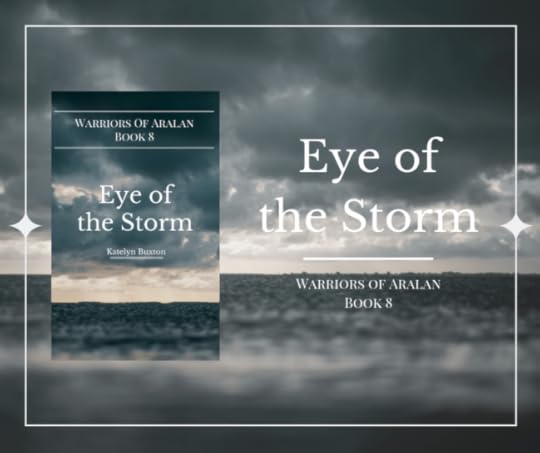
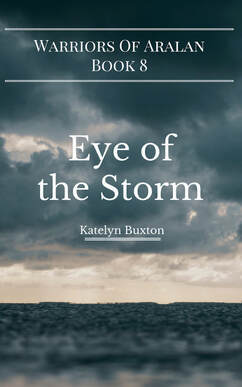 This book has tried my patience more than any other book I've ever written. (How's that for an affectionate author intro?) We authors like to call our books our children, and in a way they are. But if that's true, then Eye of the Storm is the problem child in the Warriors of Aralan family. Sure, there's plenty of things to love about it (dragons, sea voyages, swords, and castles, to name a few), but to make it presentable to anyone except myself was a task worthy of the Champions of Aralan.
This book has tried my patience more than any other book I've ever written. (How's that for an affectionate author intro?) We authors like to call our books our children, and in a way they are. But if that's true, then Eye of the Storm is the problem child in the Warriors of Aralan family. Sure, there's plenty of things to love about it (dragons, sea voyages, swords, and castles, to name a few), but to make it presentable to anyone except myself was a task worthy of the Champions of Aralan."Why should I read this horrible book if even the author doesn't like it?" you ask—and that's a very good question. The answer is very simple: children grow up. Yes, even bookish children. The baby that was born without even knowing how to walk will eventually run a 5k and leave your creaky old authorly bones behind. Eye of the Storm has grown up. And if you'd like to take a peek behind the lovely cover I have presented to you today, you can! Just click the button below, and you can sign up to be an advanced review copy reader. Haven't read Journey to Freedom? No problem. I have a fix for that too. Just follow the link, and you can get a copy of both!
Happy reading! Sign up for an ARC copy!
Published on September 01, 2019 09:00
October 1, 2018
September Book Reviews
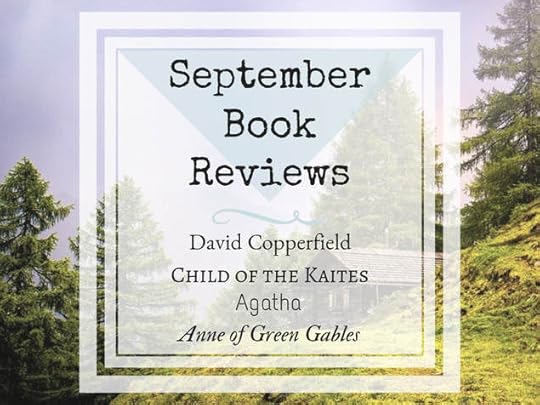 All told, September was a very good reading month! I began it with David Copperfield by Charles Dickens—followed by Child of the Kaites by Beth Wangler, and Agatha by E.B. Dawson—and ended it with Anne of Green Gables, Anne of Avonlea, and Anne of the Island, all by L.M. Montgomery. Any time I find myself unable to fit all of the books I read onto the blog post header, I know I've done a lot of reading!
All told, September was a very good reading month! I began it with David Copperfield by Charles Dickens—followed by Child of the Kaites by Beth Wangler, and Agatha by E.B. Dawson—and ended it with Anne of Green Gables, Anne of Avonlea, and Anne of the Island, all by L.M. Montgomery. Any time I find myself unable to fit all of the books I read onto the blog post header, I know I've done a lot of reading! And so, I present to you these six reviews, in a post which will probably be the last of its kind for a while. Life has gotten much busier of late, and as much as I love writing book reviews, (and blogging in general), they're both one thing too many at the moment. I may continue to write the occasional short review on Goodreads, but for now, I'm going to take a break from all blogging. Thank you so much to everyone who has been on this journey with me!
David Copperfield
Charles Dickens
My rating: ★★★★
David Copperfield reads like a fictional autobiography, and from the very beginning, the first-person narrative put me in mind of Great Expectations. I was invested in David from the moment he was born at twelve o’clock on a Friday night, and the suffering of his boyhood did nothing but strengthen it. He could have become hardened and closed himself off from the world, but he didn’t, and I found that to be a refreshing change.
As is usual with Dickens, the characters are vivid and varied, the settings are so life-like I could almost taste the salt air of the seaside, and all the subplots twist together to create a satisfying finale with no loose threads. By the end, the good-hearted but rather young David has matured enough to discipline his heart while still retaining everything that made him such a likeable character to begin with.
There were also a couple very unique things about this book that I would like to mention:
1.) Both a dwarf and an (autistic?) man were portrayed in a positive light.
2.) The girl the protagonist marries is not necessarily the right one.
Many books—old ones, especially—tend to look down on people just because they’re different, so the fact that these two characters even existed, was a pleasant surprise. I have to admit that I winced a little when Miss Mowcher first came on the scene, but she soon showed that bodily defects do not equal mental ones. And Mr. Dick, by contrast, proved that what some would call those same mental “defects,” were not defects at all, and actually enabled him to see the world in a way few others could.
As for the second point, I won’t say much for fear of spoilers, but so often, the first person the protagonist really falls for ends up being Mr. or Miss Right. The fact that this trope was not used was a refreshing twist.
Content comes in the form of childhood abuse, drinking, one passing reference to “lovemaking” in connection with a honeymoon, and a light smattering of language. There’s also a Lydia Bennett-esque elopement (minus the marriage), and the aftermath of such a disastrous decision, in which Lydia is repentant.
David Copperfield is not merely a pointless, wandering chronicle of David’s life—it’s a tale of hasty decisions, and living with them. It’s a journey from innocent child, to impulsive youth, and finally, to a matured man with an understanding of life, and of family. It’s a tale of growing up, and the mistakes we make as human beings. And I think that’s something we can all relate to.
~~~~~~~~~~~~~~~~~~~~~~~~~~~~~~~~~ Child of the Kaites
Beth Wangler
My rating: ★★★★
Child of the Kaites is a wonderful fantasy reimagining of the Exodus, complete with plagues, bird lions called axex, and a glowing sword. While reading it, I was in awe of how familiar it felt, while still managing to feel new at the same time. It follows the Bible’s history very well, but adds new twists of its own to make it unique.
I’m generally not a fan of first person, and definitely not first person present tense, (it just doesn’t work for me), but it turned out well for this story. Rai was a very palpable protagonist, and I loved watching Savi stay by her side through thick and thin. Then there's Forziel. I have a huge soft spot for comic relief characters that don’t come from an easy background. He and Yori were great sidekicks, and… Lev… was half mysterious warrior type, and half loveable grandfather who just doesn’t understand his grandkids.
Another thing I really enjoyed was the way Wangler chose to show the reality of the spiritual realm, and the warfare that constantly goes on around us. The aivankaites tried many times to stop Aia’s people from doing His will, but the kaites were always there to fight them off. [spoiler] One thing, however, happened during the climax that left me scratching my head. Someone surrendered himself to Aivanah, AKA Satan, on the condition that he would leave the Maraians alone. I understand why this would tempt Aivanah, since the person in question was immortal, but only God has the power to really stop Satan. Immortal or not, a human being would not have that power. So I’ll be interested to see how that plays out in book two. [spoiler finished]
The world-building also felt real. From the differing beliefs of the different people groups, to the chanavea necklace each Maraian wore, to the kaites and aivankaites, and architectural differences between Ira and Izyphorn, everything was thought out. The Maraians were also so very… Jewish. They passed down the histories (or at least Rai did), were enslaved to Izyphorn, and were divided into tribes. The chanaveas were another very Maraian thing, like the tassels on a Jewish person's clothing.
Child of the Kaites is also pretty clean. The only thing I can think of to comment on is the fact that there’s a scene where newlyweds are shown waking up in the village’s “marriage hut.” But since their lives are threatened almost immediately after, the scene moves on quickly.
Together, Rai and Savi form the Moses and Aaron duo we all know so well from the Old Testament. The Bible, however, rarely fills in what a person is feeling, and Moses must have sometimes been rife with doubt, even after the burning bush told him “Go.” Child of the Kaites underscores Rai’s humanity by showing her struggles. I think many of us have been called to do something, set out to do it, and then wondered, later on, whether we really were called to such a thing. Perhaps we misunderstood God. This is a character arc I don’t see often, and I appreciate it. I related to Rai in her struggles, and I’m looking forward to more from Wangler.
~~~~~~~~~~~~~~~~~~~~~~~~~~~~~~~~~
Agatha
E.B. Dawson
My rating: ★★★
Agatha tells the story of a woman who had everything she ever wanted, until she gave it up to marry the man she loved. Some might call that clichè, but it’s a plot device I enjoy, when it’s done well. Unfortunately, like with Rodge, I had a hard time connecting with Agatha. I think part of it was due to the fact that I couldn’t remember who she was from The Traveler (or is she yet to be introduced?), but I had no frame of reference for looking at her story.
Still, Agatha was very well written, with a clearly-defined plot. A good short story in all, but not my favorite of Dawson’s works.
~~~~~~~~~~~~~~~~~~~~~~~~~~~~~~~~~
Anne of Green Gables
L.M. Montgomery
My rating: ★★★★★
Anne of Green Gables is one of a very few books I have read three times. I first read it when I was a kid, but unlike Little Women—which left a heavy imprint of disgust on me at the time—I don’t remember really having an opinion of it at all. That’s probably why I picked it up again in my late teens, took another look at it, and have loved it ever since.
Anne Shirley, that starry-eyed Canadian orphan, taught me to value the little things in life. She taught me to use my imagination, and see the romance in everyday happenings. She also taught me that you don’t have to be rigidly practical to get through life. Granted, there is a balance, (after all, no one likes liniment-flavored cakes), but keeping a little of the wonder of childhood is a very rare and precious thing.
As for the other characters, I was surprised at how much I related to Matthew and Marilla this time around. I used to think Marilla was rather harsh, but now I see that she was only that way because she wanted so much to do right by Anne, and her love found no other outlet. Matthew, by comparison, had no problems showing his affection, even if it was only by listening to Anne’s chatter and not telling her that her tongue must be fastened on both ends. Mrs. Lynde was the picture of a town gossip, Diana a rather normal girl in comparison to Anne, and—as other reviewers have pointed out—all the characters seemed life-like enough to be your next-door neighbors. I was particularly struck at how real the schoolhouse dynamics were.
This book is equal parts charm, joy, and sadness. There were multiple times I laughed out loud, and even a few that I had tears in my eyes. Having read it twice before, I knew what was coming, but I was still swept away by the strength of Anne’s joy, and by contrast, her grief. This is a book that has stood the test of time, and will continue to do so, because we all need a reminder to value the little, beautiful, things in life—like summer dusk, sparkling brooks, and cherry trees laden with blossoms.
"Isn't it splendid there are so many things to like in this world?"
~~~~~~~~~~~~~~~~~~~~~~~~~~~~~~~~~
Anne of Avonlea
L.M. Montgomery
My rating: ★★★★
Anne of Avonlea continues in the tradition of everything that made Anne of Green Gables such a lovely, heartwarming book. Anne is no longer the well-meaning orphan rushing headlong into every fresh slip-up, but I found her young womanhood to be just as interesting, if not more. (Although she still made her fair share of mistakes!) There are many changes ahead on the horizon for Anne—including growing up—but instead of dulling her imagination, I believe experience has only made it truer, and more poetic than ever.
“After all, I believe the nicest and sweetest days are not those on which anything very splendid or wonderful or exciting happens but just those that bring simple little pleasures, following one another softly, like pearls slipping off a string.”
~~~~~~~~~~~~~~~~~~~~~~~~~~~~~~~~~
Anne of the Island
L.M. Montgomery
My rating: ★★★★
Anne is just the sort of character you can come back to with a sigh and find the respite you need from busy, day-to-day life. I enjoyed watching Anne head out to Redmond, and keep house with her friends at Patty’s Place. Her relationship with Gilbert is the frustrating, when-will-they-wake-up kind, a la Pride and Prejudice, but was ultimately satisfying. Altogether, L.M. Montgomery does not disappoint!
“And she was richer in those dreams than realities; for things seen pass away, but the things that are unseen are eternal.”
Published on October 01, 2018 00:00
September 22, 2018
Warriors of Aralan Book Sale
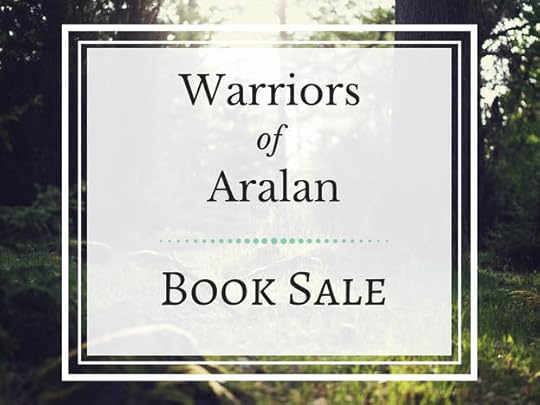 I'm going to college!
I'm going to college!To celebrate, I've decided to make three of the Warriors of Aralan books $0.99 for three days! *confetti* Branwen’s Quest, Finding Hope, and Journey to Freedom are books one, four, and seven, respectively, but each of them marks a beginning in the series, and can be read alone without confusion. (Although if you take it into your head to buy the rest of the series, I certainly won't stand in your way.) ;P
Now, for the best part. If you've been wanting to check out the Warriors of Aralan series, now's your chance to get three of them for $0.99 apiece, instead of $2.99. It's pretty much three for the price of one. So go get ‘em!
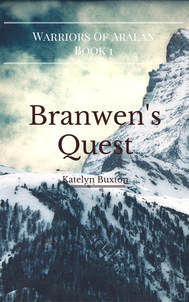 Branwen's Quest (Warriors of Aralan #1)
Branwen's Quest (Warriors of Aralan #1)-----------------------
When the royal herald came announcing a mandatory Tournament of Warriors, Branwen was the last one to get excited. Sure, she was a good enough archer, but why should she be forced to go to the tournament just because the king said so? She had nothing to prove! Yet when she got there her competitive spirit took over and she succeeded—enough so that she was singled out by the king to take a difficult journey with three others who were as different as night and day from each other. Why? To recover the king and queen's missing crowns. Will they ever be able to overcome their differences and get along to complete their mission, or will they fall prey to an unexpected danger posed from within?
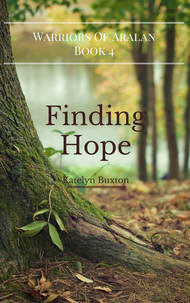 Finding Hope (Warriors of Aralan #4)
Finding Hope (Warriors of Aralan #4)-----------------------
Branwen’s fourteen-year-old daughter Rhoslyn, is intrigued when she comes home one day to find three strangers in the house, arguing with her parents. Who are these men? Two of them appear to be the same age as her father, but one of them is younger—much younger, about her age. He turns out to be Allister, Rhoslyn’s cousin, and he with his father and uncle have come all the way from Norwynnd. Needless to say, Rhoslyn and her best friend Bradyn get off to a bad start with Allister when they find him unusually secretive, and instead of deterring Rhoslyn with his bad attitude, Allister unwittingly encourages her curiosity. She knows he has a secret, and she’d determined to find out what it is. To complicate matters, a dark-skinned man from Calima, Aralan’s closest neighboring country, appears the day after Rhoslyn’s relatives, bringing with him a new religion, and it looks like he’s going to be there a while due to his broken leg. While he’s there he insists on telling others about his faith, and Rhoslyn doesn’t know what to think. Why is her cousin so secretive? Why does this man from Calima think she needs God? And most of all, why have her relatives from Norwynnd come to Linfort now, after all these years?
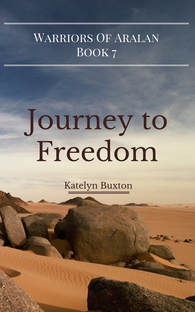 Journey to Freedom (Warriors of Aralan #7)
Journey to Freedom (Warriors of Aralan #7)-----------------------
Josiah is a prince... albeit one that has just about had it with his hypocritical parents and grandparents, the ruling family of Aralan. Sure, he's not that much different than they are, really—but when they turn down a small country's plea for help in an oncoming war, Josiah is furious. A full one-eighth of his blood comes from that country, and he can't believe his ears when they send the emissaries away without a promise of assistance. So he flees the castle, hires a cook to feed him in his travels, and breathes the free forest air for the first time in his twenty-one years of life. Sleeps on the ground for the first time in his life. And argues—constantly—with the most stubborn cook he's ever met in his life. Emma is not one to take orders quietly, despite coming from the poorest part of Freymont; a stark contrast with her sweet-tempered, eleven-year-old sister named Hadassah. Add in Josiah's crazy hermit uncle, a pair of mischievous identical twins, an unheard-of amount of sass, a war of epic proportions, and a betrayal or two—and you have a Journey to Freedom.
Published on September 22, 2018 00:00
September 1, 2018
August Book Reviews
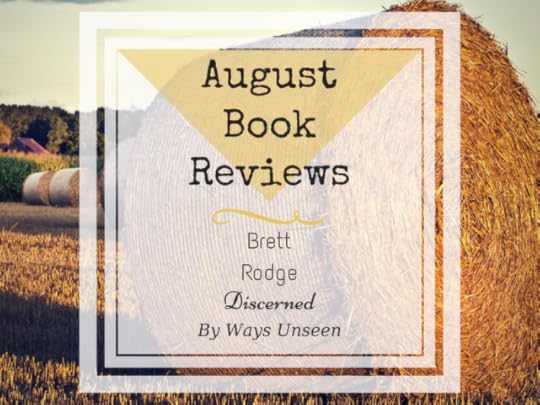 This month, every book I finished was written by an indie author, and that's always a win in my opinion! I read Brett and Rodge by E.B. Dawson, Discerned by Sarah Addison-Fox, and By Ways Unseen, by Daniel Dydek. I enjoyed all of them, so if you're looking for some independent authors to read, look no further!
This month, every book I finished was written by an indie author, and that's always a win in my opinion! I read Brett and Rodge by E.B. Dawson, Discerned by Sarah Addison-Fox, and By Ways Unseen, by Daniel Dydek. I enjoyed all of them, so if you're looking for some independent authors to read, look no further!Brett
E.B. Dawson
My rating: ★★★★
Brett fills in the backstory of a character Dawson first introduced in The Traveler. It's a bit of a feels-jerker, (which is always a compliment in my book), and as always with Dawson's writing, concise and to-the-point. It was nice to have Brett's history illuminated, and I'm looking forward to reading the rest of the Lost Empire short stories!
~~~~~~~~~~~~~~~~~~~~~~~~~~~~~~~~~
Rodge
E.B. Dawson
My rating: ★★★
I remembered Rodge as being one of my favorite minor characters from The Traveler—aside from Anissa’s house ;)—so I was excited to dive into this short story and learn more about him.
His history, unfortunately, is one that too many share... an illegitimate child raised by his mother, and a father that isn’t often around. Add to that the fact that he’s brilliant but bored, and he soon gets himself in trouble. I think I would have liked this story a lot more if I had been able to see inside Rodge’s head. Sure, he had a rough start in life, but I wasn’t really able to connect with him in the time given.
It’s still a very good short story, however, and marked by Dawson’s precise, clean-cut writing style. I’m glad to have gotten to know Rodge better!
~~~~~~~~~~~~~~~~~~~~~~~~~~~~~~~~~ Discerned
Sarah Addison-Fox
My rating: ★★★★
~ I received a free ARC in exchange for an honest review ~
I have been privileged to read all three of the previous books in the Allegiance series, and I have to say—they’ve never disappointed. Discerned was a wonderful way to cap off the end of the series, and it really brought things full circle.
More than one long-standing plot arc was wrapped up, and I enjoyed seeing married people take the lead in a YA book for a change. And can I just mention Torrance and Amaya for a minute? Those two are serious scene stealers, let me tell you. I love both of them, but especially Amaya. Lady Enjolras strikes again. :P
Then we have Mick and Celeste, who are still working, growing, and learning how to trust Etra more with their lives. Mick still stumbles all over himself from time to time (which is honestly one of his most endearing traits), and Celeste still struggles with believing she’s loved, but they never stop moving forward.
As for content, there’s the usual drinking and smattering of curse words, but the thing I struggled with the most is probably the continued use of sexual innuendo--however—it is used with a godly perspective. The characters are more concerned with marital fidelity than falling for whichever good-looking guy (or girl) happens along next, and I appreciate that.
Speaking of which—an extremely good-looking girl does happen along, which creates problems. For most of the book I wanted to chuck her out of the window, but after hearing a little bit more about her past, I was able to pity her. There were certain things about her brief arc that I wasn’t really satisfied with, however. And another character that had been around from the beginning ended up with a really sudden Love Interest™, which felt rushed.
But nitpicky gripes aside, Discerned delivered a satisfying ending, and anyone that enjoys action-packed YA with a vein of romance will enjoy the Allegience series.
~~~~~~~~~~~~~~~~~~~~~~~~~~~~~~~~~
By Ways Unseen
Daniel Dydek
My rating: ★★★★
By Ways Unseen is a LOTR-esque high fantasy adventure that I quite enjoyed. There was a new and interesting use of magic, a good dose of fantastical creatures (some of which I haven’t seen in a novel before), and a quartet of characters that grew together through thick and thin. “And who are these characters?” you ask. Well...
• Haydren: The Main Character. The Hero. The guy who has the most growing to do. Honestly, he could be a little irritating at times, but aren’t we all? I appreciated that Dydek put a character out there that wasn’t always likable. I also enjoyed his character arc, as regarding the God of All.
• Geoffery: While we’re talking character archetypes, we can’t forget the Mentor. But he wasn’t always right, and I loved how his backstory was revealed as the plot progressed. There was a very good reason he believed what he believed, and I liked that he wasn’t right “just because,” as some mentor characters are apt to be.
• Pladt: *tosses actual archetypes out the window* This li’l character was the Cinnamon Roll in my unofficial official opinion. It didn’t take long for Pladt to become one of my favorites, and he provided some much-needed comic relief. I kept grinning whenever he was on the page.
• Sarah: The… Sorceress? She provided the female element to the story, and on the whole, I rather liked her. The only thing that somewhat bothered me was how she seemed inclined to buckle under pressure—but on the whole she carried herself with dignity, without coming across harsh—and that’s something sorely lacking in today’s stories.
Another thing I enjoyed was the creatures, and the enormous scope of the world. The creatures were a pretty eclectic mix (kobolds, and gremlins, and dragons oh my!), and the huge scope of the story put me in mind of The Lord of the Rings. Granted, I was soon lost with all the directions being given, but that’s probably just me, since I'm notoriously bad at geography.
I also liked how the magic was handled. [spoiler] It reminded me of that verse in 1 Corinthians that says all things are lawful, but not all things are helpful. [spoiler finished] I can’t say I’ve seen magic done that way before, and thought it was a unique twist.
As for content, the book is pretty clean, aside from a little drinking, non-gory violence, a trip hiding in the back of a wagon with cadavers, (yikes), orphans were mentioned to usually be the product of prostitution, a scene where a woman was asked whether she had begun her “women’s custom,” and another where an extremely bad-tempered not-morning person threatened to castrate the person that woke him up.
All told, By Ways Unseen tells a familiar tale about good vs. evil, and making tough choices. The characters weren’t perfect, and some elements of the storytelling felt a little uneven, but it was a good book in the end.
Published on September 01, 2018 00:00
August 16, 2018
French Names – Male
 It seems that lately I've been hearing a whole lot about France, (a side effect of my Les Mis, A Tale of Two Cities, and Scarlet Pimpernel obsession), so I thought that I may as well compile a list of French names for your character-naming pleasure, since I haven't added France to my name list collection yet.
It seems that lately I've been hearing a whole lot about France, (a side effect of my Les Mis, A Tale of Two Cities, and Scarlet Pimpernel obsession), so I thought that I may as well compile a list of French names for your character-naming pleasure, since I haven't added France to my name list collection yet.Unfortunately, I can't really say that most of these names are French in origin, since many of them have roots in the Bible, or other parts of Europe, and are therefore simply "Frenchified" versions of more traditionally recognized names—but they are French in usage. For example, Élie is the French form of Elijah.
However, if French names aren't really for you, I've compiled lists of several other ethnicities, encompassing a wide range from Hebrew to Irish.
• • • •
I'll be posting the feminine side of this list in September. Enjoy!
A
Adélard – noble; brave; hardy
Adolphe – noble wolf
Aimé – beloved
Alain – little rock; handsome
Aldéric – old; ruler; power
Alexandre – defending men
Amable – lovable
Amand – lovable; worthy of love
Amaury – work; labor; power
Ambroise – immortal
Amédée – love of God
Anatole – sunrise
André – manly
Antonin – ?
Armand – army man
Armel – bear; prince
Aubin – white; bright
Auguste – great; venerable
Aurèle – golden; gilded
Aurélien – golden; gilded
B
Baptiste – baptist
Basile – king
Bastien – from Sebaste
Benoît – blessed
Bérenger – bear; spear
Blaise – lisping
Brice – speckled C
Calixte – most beautiful
Camille – ?
Casimir – to destroy; peace; world
Célestin – of the sky; heavenly
Césaire – hairy
Charlot – man
Christophe – bearing Christ
Claude – lame; crippled
Clément – merciful; gentle
Corin – spear
Corneille – horn
D
Damien – to tame
Deniel – form of Daniel; God is my judge
Désiré – desired; wished
Diodore – gift of Zeus
Dominique – of the Lord
E
Edgard – wealth; fortune; spear
Edmé – wealth; fortune; protection
Edmond – wealth; fortune; protection
Édouard – rich guard
Élie – form of Elijah; my God is YAHWEH
Éloi – to choose
Émeric – power
Émile – rival
Émilien – rival
Étienne – crown
Eugène – well-born
Évariste – well-pleasing
F
Fabien – bean
Félicien – lucky; successful
Fernand – journey; daring; brave
Firmin – firm
Flavien – golden-haired
Florent – prosperous; flourishing
Florentin – prosperous; flourishing
Florian – flower
Francis – Frenchman
Francisque – Frenchman
François – Frenchman
Frédéric – peaceful ruler
G
Gabin – ?
Gaspard – treasurer
Gaston – stranger; guest
Gautier – ruler of the army
Gauvain – ?
Georges – farmer; earthworker
Gérald – ruler of the spear
Germain – brother
Gervais – spear
Ghyslain – hostage; pledge
Gratien – grace
Grégoire – watchful; alert
H
Henri – home ruler
Hervé – battle-worthy
Hilaire – cheerful
Honoré – esteemed; distinguished; honored
J
Jacques – supplanter
Jean – form of John; YAHWEH is gracious
Jérémie – form of Jeremiah; YAHWEH will exalt
Joffrey – ?
Josse – lord
Jules – ?
Julien – ?
Juste – just
Justin – just
L
Laurent – from Laurentum
Laurentin – from Laurentum
Lazare – my God has helped
Léandre – lion; man
Léo – lion
Léon – lion
Léonce – lion
Léopold – people; bold
Loan – light
Lothaire – famous army
Louis – famous; war; battle
Loup – wolf
Luc – form of Luke; from Lucania
Lucien – light
M
Mael – chief; prince
Marcelin – ?
Matéo – form of Matthew; gift of YAHWEH
Mathéo – form of Matthew; gift of YAWHEH
Mathys – form of Matthew; gift of YAHWEH
Maurice – dark-skinned
Maxime – greatest
Maximilien – greatest
Mickaël – who is like God?
Moïse – son; deliver
N
Napoléon – sons of mist
Nathanaël – God has given
Nicolas – victory of the people
Noël – Christmas
O
Octave – eighth
Odilon – fatherland; wealth; fortune
Olivier – ?
P
Pascal – relating to Easter
Patrice – nobleman
Philippe – friend of horses
Pièrre – stone
R
Rainier – advice; army
Raphaël – God heals
Régis – ruler
Rémi – oarsman; rower
Renard – fox
René – born again
S
Sébastien – from Sebaste
Séraphin – fiery ones
Sévère – stern
Séverin – stern
Sixte – scraped; polished; sixth
Sylvain – wood; forest
Sylvestre – of the forest
T
Théophile – friend of God
Thierry – ruler of the people
Timothé – honoring God
Toussaint – all saints
Tristan – ?
V
Valère – to be strong
Valérian – to be strong
Vivien – alive
Y
Yann – form of John; YAHWEH is gracious
Yannic – form of John; YAHWEH is gracious
Yezekael – lord; prince; generous
Yoann – form of John; YAHWEH is gracious
Yves – yew
Z
Zacharie – form of Zechariah; YAHWEH remembers
Names taken from Behind the Name.
Published on August 16, 2018 00:00
August 1, 2018
July Book Reviews
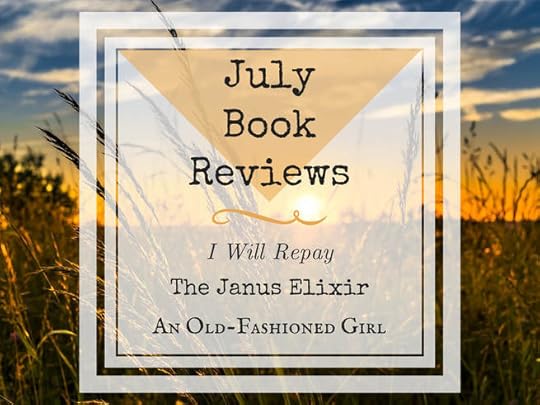 July was another one of those months that I got more reading done than I realized! On the list was I Will Repay and The Elusive Pimpernel by Baroness Emmuska Orczy, The Janus Elixir and The Hound of Duville by Kyle Robert Shultz, and An Old-Fashioned Girl by Louisa May Alcott. They were all delightful reads, and just too many to fit them all on the graphic above. :P
July was another one of those months that I got more reading done than I realized! On the list was I Will Repay and The Elusive Pimpernel by Baroness Emmuska Orczy, The Janus Elixir and The Hound of Duville by Kyle Robert Shultz, and An Old-Fashioned Girl by Louisa May Alcott. They were all delightful reads, and just too many to fit them all on the graphic above. :PThe first two are swashbuckling adventures set during the French Revolution, the second two are tales full of Shultz's characteristic humor, and the last was a quiet, old-fashioned tale of love and friendship that I quite enjoyed.
I Will Repay
Baroness Emmuska Orczy
My rating: ★★★★
[There may be some vague spoilers for The Scarlet Pimpernel in the following.]
I Will Repay is North and South meets The Scarlet Pimpernel in all the best ways. It’s a high-stakes adventure set during the French Revolution instead of the Industrial one, with all the aggravating misunderstandings that usually crop up in old-fashioned romances like this. (You know, the kind that makes a book really, really hard to put down.)
Juliette Marny is another strong yet feminine female character reminiscent of Marguerite Blakeney, who (quite frankly), really messed things up from a misguided sense of justice, but was equally ready to do everything in her power to make them right again. I loved her! I think character arcs like that are sorely lacking in today’s stories. So often characters make mistakes and wallow in them, instead of moving forward like a warrior, admitting that they were wrong, and trying to set things right.
Paul Déroulède, on the other hand, is not the swashbuckling type of Hero/Love Interest from The Scarlet Pimpernel. He’s quiet, but fearless, and can always be relied upon to do what’s right. He rose above the degeneracy of his people during the Revolution, and made them feel human again by retaining a human heart himself.
The plot—while not very different from The Scarlet Pimpernel in the main points—felt a lot grittier than its predecessor. Most of the previous book was spent in England, and we only got a very narrow glimpse at France towards the end. The entirety of I Will Repay is spent in France during one of the bloodiest years of the Revolution. I think Orczy did a horribly beautiful job of underscoring the brutality of the time.
As for content, there are various passing references made to sexual immorality and rape (very brief, and not at all explicit), some “demming” on the part of the Pimpernel, (although less than the first book), drinking, and one female character takes accusations of “wantonness” upon herself in order to save the man she loves. (She was completely innocent of such charges.)
In closing, I think it’s fair to say that if you liked The Scarlet Pimpernel, you’ll like I Will Repay. It takes the same formula for glorious adventure and recreates it in an entirely new way. I also appreciated the fact that “true love” was shown to be seeing someone’s faults and loving them anyway, as well as the theme that vengeance belongs to the Lord. It’s a worthy addition to the series!
~~~~~~~~~~~~~~~~~~~~~~~~~~~~~~~~~ The Janus Elixir
Kyle Robert Shultz
My rating: ★★★★
I don’t even know where to begin. I don’t think I’ve read anything by Shultz that I don’t like, and The Janus Elixir is no exception! It’s full of the offbeat sense of humor that characterizes Shultz’s writing, and the fact that he’s now strayed into the territory of literary classics is another huge plus… in my highly-biased, classics-loving opinion. :P
Anything based off the Strange Case of Dr. Jekyll and Mr. Hyde is bound to be creepy, (especially when Frankenstein is thrown in for good measure), but it never went too far in that direction, since the aforementioned humor always buoyed it up. Plus, I loved watching Malcolm and Melody interact! I think what I like most about them is the fact that Melody is probably the only person who can get away with giving a dragon cheek, and not get burnt to a crisp. xD
Another thing I enjoyed seeing was the message that everyone matters, and that the history of the Afterverse was finally explained, all the way from its creation to the present, through one long-suffering reel delivered by Mr. Malcom Sass-Dragon Blackfire himself. I also liked that the “little g” gods were clearly differentiated from the “big G” God, and that the former were basically just immortal, extra-powerful people.
In closing, if you haven’t read anything by Shultz yet, you’re really missing out. The Janus Elixir packs a surprisingly twisty plot into a novella-sized package, filled with likable characters, literary references, and just enough creepy to keep you on the edge of your seat!
~~~~~~~~~~~~~~~~~~~~~~~~~~~~~~~~~
The Elusive Pimpernel
Baroness Emmuska Orczy
My rating: ★★★★
Any scene with Marguerite and Percy Blakeney in it is bound to be A+. Any scene with The Scarlet Pimpernel and Chauvelin is bound to be A++. And since I Will Repay introduced a whole new cast of characters, it was so lovely to get back to the original ones again and watch The Scarlet Pimpernel run rings around Monsieur Chauvelin. I was cracking up more than once—and while this is probably going to be one of the shortest reviews I’ve written in a long time—I don’t think there’s much to say. Baroness Emmuska Orczy knew how to tell a very good story, and The Elusive Pimpernel is no exception.
~~~~~~~~~~~~~~~~~~~~~~~~~~~~~~~~~
The Hound of Duville
Kyle Robert Shultz
My rating: ★★★★
The Hound of Duville is another hilarious addition to the Afterverse, and I loved watching Nick and Crispin take the lead again! I found myself frequently comparing it to The Beast of Talesend, because it’s probably the most light-hearted Beaumont and Beasley adventure to come around in a while. (Not that that’s bad thing—I like stories with weight—this one just reminded me more of the origins of the series.)
Crispin is effervescent and optimistic, Nick is as likeably grumpy as ever, and Cordelia is her NICK!-what-are-you-doing self, and it’s wonderful. Also: have I mentioned a sentient house? Because there’s a sentient house. You can never go wrong with that.
Add in Thor and Emperor’s New Groove references, and a rather 101 Dalmatians-esque plot, and you have The Hound of Duville. I was laughing out loud more than once, and have decided that it is officially impossible to go wrong with anything Shultz writes.
~~~~~~~~~~~~~~~~~~~~~~~~~~~~~~~~~
An Old-Fashioned Girl
Louisa May Alcott
My rating: ★★★★
I went into this book knowing it would be good, and needing “a little old-fashioned,” (to shamelessly quote Phil Coulson), but I had no idea that it would take me on such a roller-coaster of emotions. I experienced just about every feeling under the sun while reading An Old-Fashioned Girl... and that's the true magic of storytelling.
Polly
"I don’t want a religion that I put away with my Sunday clothes, and don’t take out till the day comes round again; I want something to see and feel and live by day-by-day.”
This girl is one of Alcott’s characteristic strong-yet-feminine heroines, and I liked her more and more as the story progressed. She was a lot like Meg from Little Women, and to be honest, a big chunk of the book was like an extended version of Meg’s visit to the Moffats. But instead of succumbing so much to peer pressure, Polly brought her good old-fashioned sunshine into the worldly-minded house of the Shaws. That said, she was still an imperfect human being, and I loved that.
Tom
“… I’m only a curse instead of a comfort.”
Tom reminded me so much of Laurie, that I couldn’t help but love him. His character arc was one of the most poignant in the book (although his sister Fanny did a fair amount of growing too), and by the end he’d gone from a harum-scarum boy, to an unmistakable dandy, and finally, to a man.
Another thing I have always liked about Alcott’s writing is her witty descriptions. I found myself frequently stopping to chuckle, smile, or simply ponder a phrase or idea. There was a fair amount of “moralizing,” as some of her characters would put it, but I never found it overpowering. We need more old-fashioned girls (and boys) in the world.
In closing, if you like sweet, simple tales of love, friendship, and remembering the important things in life, this book is for you.
Published on August 01, 2018 00:00
July 16, 2018
Author Update 2018
 This post is going to be a departure from my typical writing help-related blog posts, and give all of you lovely people a quick update on where I’m at in the writing process, and what I have planned for the future. I’ve been thinking about doing this post for a while, mainly because I always enjoy author updates, and also because there are a lot of new things on the horizon for the Warriors of Aralan series. Pull up a chair!
This post is going to be a departure from my typical writing help-related blog posts, and give all of you lovely people a quick update on where I’m at in the writing process, and what I have planned for the future. I’ve been thinking about doing this post for a while, mainly because I always enjoy author updates, and also because there are a lot of new things on the horizon for the Warriors of Aralan series. Pull up a chair!Warriors of Aralan #9
[distant sobbing because it still needs a name]
I am the worst at cooking up titles, but I’ll figure one out eventually, never fear. The exciting news is this: I’m probably about two-thirds of the way done editing/rewriting/working out all the kinks, and, (Lord willing), it’ll come out sometime later this year! [confetti]
Freedom from the Darkness
I owe everyone a bit of an apology here. Since publication, I’ve never really felt right about this book, and I plan to revise it in the near future, then release it again. It can be so much better than it is. (In the meantime, however, feel free to check out any of the other Warriors of Aralan books.)
A Warriors of Aralan Short Story Collection
[throws more confetti]
I’ve been working on a short story collection to offer for free to all my wonderful newsletter subscribers. It’s not ready yet, but it will have three stories—one that explains why Norwynnd has guard towers, the one that I wrote last Christmas titled His Favorite Rakkaus Story , and one that’s still in the works. All three will be from different eras of Aralan’s history, and I can’t wait to offer it to you guys.
An Expansion to the Warriors of Aralan Series
Last but certainly not least… [drum roll] … I’ve finished writing the Warriors of Aralan series, but I have a couple “side series,” in the works: one that takes place in ancient Aralan, and one that takes place in Eclon, starting about the time of Warriors of Aralan #9. They’ll be short—only two or three books each, but they’ll flesh out the world of Aralan even more. It’s already come so far from the days of Branwen’s Quest, and I can’t believe how much it’s grown. [grabs a tissue for happy book parent tears]
So, folks, there you have it… a peek into the insanity that’s my brain. I don’t have definite dates for any of this yet, but I thought I’d give you a preview of what’s to come for the Warriors of Aralan series.
Published on July 16, 2018 00:00
July 1, 2018
June Book Reviews
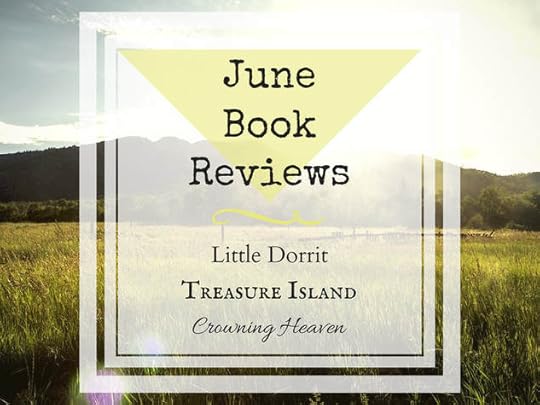 June's reading brought the completion of Little Dorrit by Charles Dickens, Treasure Island by Robert Louis Stevenson, and Crowning Heaven by Emily Hayse. The first was a rewarding (if long) read, the second, probably the most piratey book I've ever read, and the third, a familiar high fantasy tale about a young queen who suddenly finds herself leading a war between two countries.
June's reading brought the completion of Little Dorrit by Charles Dickens, Treasure Island by Robert Louis Stevenson, and Crowning Heaven by Emily Hayse. The first was a rewarding (if long) read, the second, probably the most piratey book I've ever read, and the third, a familiar high fantasy tale about a young queen who suddenly finds herself leading a war between two countries.If you like thoughtful books, this month's list is for you!
Little Dorrit
Charles Dickens
My rating: ★★★★
Little Dorrit is chock full of everything that makes a Dickens novel a Dickens novel. Witty (albeit lengthy) prose, vivid characters, the intricate plot of his later works, sharp satire, an unflinching portrayal of the lowest rungs of society, and a wry sense of humor. In short, it delivered everything I’ve come to know and love about his writing.
The title character, Little Dorrit, (otherwise known as Amy), is a beautiful example of a strong, morally upright female character that doesn’t come across as a goody-two-shoes. She wasn’t loud, and she showed her fear, but she spent the first twenty or so years of her quiet existence tirelessly waiting on the family that never knew what they had. She was the glue that held them all together. Her father, captive in the Marshalsea debtors’ prison, couldn’t take care of himself—Little Dorrit did. Her brother couldn’t hold down a job, but she never stopped trying to find him new ones. Her sister was loud, impetuous, and ungrateful, but Little Dorrit was the anchor that kept her from drifting too far on the stormy seas of life. She even worked for her living as a seamstress, and never considered it a shameful thing, even if the rest of her family did.
Arthur Clennam, on the other hand, had known a very different upbringing from the Child of the Marshalsea. He grew up in mortal terror of a God that would send small boys to eternal Damnation, with never a mention of the merciful Father of the fatherless, the Friend to the weak, the Healer of hurts. God is a just God, but He is also not willing that any should perish. Mrs. Clennam’s religion missed the latter part. Because of all this, he grew into a saddened and disillusioned man that thought he was beyond all happiness in this life. He had a good heart on the whole, but his mother’s own dark view of the world (and by result Arthur’s), stood in stark contrast to the quiet faith shown by Little Dorrit.
But the two main characters were far from the only well developed ones! It took me quite a while to read this book, but it never took me long to remember a character that has been out of the running for a while, because Dickens always made sure there was something memorable about them. Flora couldn’t finish a single sentence without starting a brand-new thought. Mr. Pancks bore a remarkable resemblance to a steam tugboat. Riguad was always easy to pick out of a crowd because when he smiled, his nose always came down over his mustache, and his mustache always went up under his nose. Dickens gave each and every character some small quirk, which made them unique.
The only reason I gave it four stars instead of five is because it didn’t quite swallow me up—I cared about the characters, but it was missing that indefinable something that makes a book “unputdownable”—and when a book misses that, and is also really long, it can drag a bit. Stylistically, the book was perfection... I just never fell head-over-heels in love with it. Content includes a smattering of language, drinking, a suicide, and implied domestic abuse, but that’s about it.
In closing, Little Dorrit tells a story of contrasts. Freedom vs. imprisonment, the rich vs. the poor, the folly of putting faith in appearances, and discovering, (for better or worse), what those appearances hide. Little Dorrit must have been groundbreaking at the time it was written, and even today it’s a breath of fresh air. Just because everyone does it, or “it is what it is,” or even looks right doesn’t mean it is right, and it certainly doesn’t mean it can’t be changed.
~~~~~~~~~~~~~~~~~~~~~~~~~~~~~~~~~ Treasure Island
Robert Louis Stevenson
My rating: ★★★
Treasure Island is a seagoing adventure reminiscent of every pirate story ever told. (And that’s a good thing!) There’s comfort in the familiar, and I think Robert Louis Stevenson pulls off the first person narrative better than just about anyone else. It suits this kind of story very well.
Before reading this book, I heard somewhere that it’s the origin of many of the stereotypes that come to mind of when thinking about pirates, and after reading Treasure Island, I’d have to agree. Not two pages in, someone was singing “Fifteen Men on a Dead Man’s Chest.” There’s a one-legged pirate named—wait for it—Long John Silver. There’s mention made of Billy Blood. They’re after treasure, found, of course, on a map marked with red crosses. There’s even a parrot that likes crying “Pieces of eight.” It’s full of that simple old-fashioned piratey charm that has captured the imaginations of so many.
Unfortunately, I found the book to be a little slow... and maybe I’m just not a pirate person? For a good portion of the book I found my mind wandering as I read, thus the two stars I docked. I never really fell in love with the characters, and Jim’s luck was off the charts. It was written for children, and as a child’s book it’s very good. I just jumped on the bandwagon too late.
There was one thing, though, that I really loved: Long John Silver, Mr. One-Legged Pirate himself. [minor spoilers ahead] It’s not often that you run across an anti-villain in old books like this. Honestly, the only way I could describe him to my sister was to compare him to Beckett from Solo. I wanted to trust him—I felt like he was capable of doing a great deal of good, if he just took it into his head to do it—but at the same time I always knew that he would only join “the good guys” if it really benefited him to do so. I love those characters... the kind that always keep you guessing. [minor spoilers over]
All in all, Treasure Island is an enjoyable read told in a comfortable style that’s part journal entry, part sitting-by-the-fire with the narrator—but it just wasn’t my cup of tea.
~~~~~~~~~~~~~~~~~~~~~~~~~~~~~~~~~
Crowning Heaven
Emily Hayse
My rating: ★★★
~ I received a free advance review copy of this book, therefore all of the following opinions are my own ~
Crowning Heaven tells a familiar rags-to-riches tale, long-lost princess and all. Some might call it cliché, but I really never mind a cliché as long as it’s done well. On the whole, I think Crowning Heaven pulls it off rather successfully. I loved the world-building Hayse put into the two kingdoms that feature most prominently in the story, and all their differences in culture and patterns of thought. The latter is something that can easily be overlooked when creating a brand-new world, but the Rodhacarians were very different from their Castellani kin in familiar, realistic ways.
For example, the Rodhacarians are a fairly stoic, level-headed people that don’t believe in old superstitions. The Castellani are passionate, and more inclined to believe the old stories. The both have their “pros and cons,” so to speak, and while I agreed more with Rodhacarian thought, the Castellani were not all wrong, either.
I also loved the descriptions of the landscape, (and clothes)! Rodhacar seems to be a wild land, untamable and beautifully rugged. They also had the Fire Plains, something that reminded me a little of Bism from The Silver Chair, but on the surface of the earth, and minus salamanders, jewels, and gnomes. It was a unique twist to an otherwise very cold, stormy, Scandinavian sort of country.
The things I wasn’t so keen on basically boil down to Heaven’s utter acceptance of everything she’s told—especially in the beginning. She never once wondered if maybe, just maybe, these strangers weren’t telling the truth. She was also willing to marry simply because she was told to, and not necessarily for love. And she ended up picking a guy who could have been her father?? That seems a little odd to me. A strong female character doesn’t have to be a tail-kicker, but Heaven seemed to be too far on the other end of the spectrum. I appreciate the fact that gentleness was one of her best traits, but I sometimes wondered how they expected her to stand the strain of ruling a whole country.
Also, the dialogue came across a little stunted, a few parts could have been chopped to quicken the pace with no damage to the plot, and most of the characters seemed pretty similar. Granted, they all had different physical appearances and backgrounds, but their personalities could have been boosted a little. Wren, Athen, and Nic were probably the best developed out of all of them.
In closing, Crowning Heaven delivers a tried-and-true story: a high fantasy telling the story of a girl named Heaven, who suddenly finds herself leading a war between two countries. It’s a very clean tale all told, with Tolkien-esque elements, and I think Hayse shows great promise as a writer.
Published on July 01, 2018 00:00
June 9, 2018
The Electrical Menagerie Blog Tour
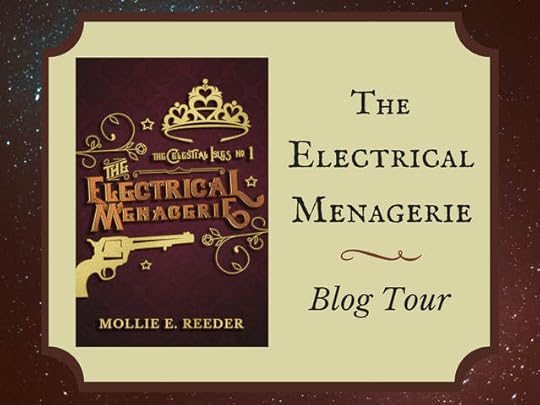 Today is a great day. "Why?" you ask. Because I get to present to you one of the best books I've read this year: The Electrical Menagerie, by Mollie E. Reeder. This book is one wild ride from beginning to end, and absolutely impossible to put down! To celebrate its release (which is today!) I've invited over the two main characters and their author for an interview. (But shhh, don't tell Carthage and Huxley about Mollie—they have no idea they're in a book. *wink wink*) After that, you can find my review of The Electrical Menagerie. Trust me, you don't want to miss out on this one!
Today is a great day. "Why?" you ask. Because I get to present to you one of the best books I've read this year: The Electrical Menagerie, by Mollie E. Reeder. This book is one wild ride from beginning to end, and absolutely impossible to put down! To celebrate its release (which is today!) I've invited over the two main characters and their author for an interview. (But shhh, don't tell Carthage and Huxley about Mollie—they have no idea they're in a book. *wink wink*) After that, you can find my review of The Electrical Menagerie. Trust me, you don't want to miss out on this one!~~~~~~~~~~--------
The Electrical Menagerie, one-of-a-kind robotic roadshow, is bankrupt.
Sylvester Carthage, illusionist and engineer, has the eccentric imagination the Menagerie needs to succeed creatively — but none of the people skills. Fast-talking Arbrook Huxley, meanwhile, has all the savvy the Menagerie needs to succeed commercially — but none of the scruples.
To save their show, Carthage & Huxley risk everything in a royal talent competition, vying for the once-in-a-lifetime chance to perform for the Future Celestial Queen. In this stardust-and-spark-powered empire of floating islands and flying trains, The Electrical Menagerie's bid at fame and fortune means weathering the glamorous and cutthroat world of critics, high society, and rival magicians — but with real conspiracy lurking beneath tabloid controversy, there’s more at stake in this contest than the prize.
Behind the glittery haze of flash paper and mirrors, every competitor has something to hide… and it’s the lies Carthage & Huxley tell each other that may cost them everything.
~~~~~~~~~~--------
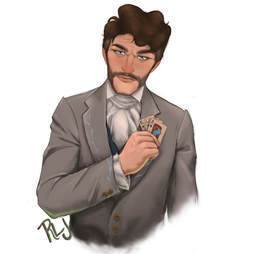 Sylvester Carthage by Randi Lynn Jackson
Character Interview:
Sylvester Carthage by Randi Lynn Jackson
Character Interview:
1.) Hello, Carthage and Huxley, and welcome! We're excited to have the producers of The Electrical Menagerie here today. Would you mind introducing yourselves?
Huxley: I’m A.Q. Huxley, producer and stage manager. My colleague, Mr. Sylvester Carthage.
Carthage: I’m the illusionist and the engineer — I built everything you see in the show.
Huxley: My wheelhouse is whatever you don’t see in the show. Location permits. Insurance. Credit rating. You know. The glamorous stuff. No autographs, please.
2.) What's it like, producing The Electrical Menagerie?
Carthage: Invigorating… exhausting.
Huxley: An adventure.
Carthage: Aye, the kind of adventure I dreamed about when I was a boy. Traveling the skies aboard a train. New faces and new places every day. Seeing the world.
Huxley: I’ll admit that living aboard the train has taken some adjustment. I grew up on acreage. It feels strange opening my window to nothing but stars. There are days when I miss good old terra firma. But I wouldn’t trade this life.
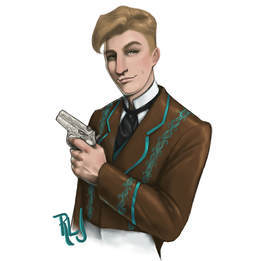 Arbrook Huxley by Randi Lynn Jackson
3.) Carthage, how do you feel about working with Huxley as a business partner? Does he make a good one?
Arbrook Huxley by Randi Lynn Jackson
3.) Carthage, how do you feel about working with Huxley as a business partner? Does he make a good one?
Carthage: Mr. Huxley is… brazen. He does things differently than I would do them. But I confess his audacity is catching. He has a way of talking that I don’t have — I’m glad I don’t have to do all the talking.
4.) Well Huxley, how do you feel about working with Carthage as a business partner? (We have to make things fair and even here, even if there are rumors of contest sabotage going around.)
Huxley: He’s right, we have different ways of doing things. Mr. Carthage is an enigma; I usually have no idea what he’ll do next. Yesterday, he pulled an electrical rabbit out of his hat at the breakfast table. I almost choked on my toast. He laughed about it for half an hour.
Carthage: (laughs)
Huxley: See?
5.) To wrap it up, how good do you think your chances are at winning the contest?
Carthage: I will stand onstage at the palace on Celestia. Some part of me has known that forever. With willpower, and ingenuity, The Electrical Menagerie will make it all the way to the end.
Huxley: And he calls me audacious? But he’s right. This contest won’t be easy — look at our competitors! But we wouldn’t be here if we didn’t think we could win. And we aren’t concerned about that so-called “sabotage” you mentioned. I’m sure there’s no grand conspiracy lurking around the corner. This is a talent show. What’s the worst that could happen?
~~~~~~~~~~~~~~~~~~~~~~~~~~~~~~~~~
 Author Interview:
Author Interview:
1.) Hi Mollie! Welcome to the blog. What made you start writing?
As a child I went through a phase where I had a lot of imaginary friends. Except it wasn’t a phase and I still have a lot of imaginary friends. But now I write books about them!
2.) What inspired The Electrical Menagerie?
When I was about twelve years old, I announced to my parents that I was going to work in Hollywood. My poor parents didn’t know how to respond, but somewhere along the line, I had fallen madly, deeply in love with the business of entertainment. I started working in freelance production shortly after high school, and I spent the last few years producing my first feature film, which was an amazing, exhausting, dream-come-true.
Through the years, my love for the industry has occasionally flickered in face of the challenges it presents, but nothing has ever been able to extinguish it. Entertainment is where art, economy, and politics all intersect. The stakes are high, the odds are insurmountable, and everybody has a fake name. What better backdrop for a great story?
3.) What ’s your favorite thing about the book?
Absolutely the characters. My stories always start with characters, and I believe that relationships are what make characters interesting and dynamic. One character with a list of traits is just a list of traits, but throw him in with another character — ideally with opposing traits — and now you have a story! Carthage & Huxley stole my heart, and I can’t wait to tell more stories about them.
4.) What was the most challenging part about writing it?
Carthage! He’s not an extremely forthcoming person, and in that strange way that only other writers will understand, he was not very forthcoming on the page when I started writing the book. I struggled at first with reconciling his two halves — he’s a consummate performer, always ready to entertain. But he’s also painfully shy. I have known actors with these (seemingly contradictory) traits, but it took me awhile to understand how they fit together. When I finally figured out who he was, that discovery was deep and rewarding.
5.) Finally, any tips for up-and-coming authors?
My main takeaway is that creative work is still work. I love it, but that doesn’t mean I always like it. I think it’s important to be honest about that because I think that when you expect pursuing your passions to be easy, or always fun, it’s too easy to be discouraged when it isn’t. You start wondering, “am I really cut out for this?” Writing is learning a new language. Writing is learning to walk, stumbling every two steps and smacking your face. Writing is groping along in the mud with your fingers looking for flecks of gold. It’s gritty and messy and your process won’t look exactly like anybody else’s. That’s why it’s yours!
If anyone wants specific advice about writing, or breaking into filmmaking, can contact me through my website. I’ll do my best to reply!
Mollie can also be found on:
• The Celestial Isles
~~~~~~~~~~~~~~~~~~~~~~~~~~~~~~~~~
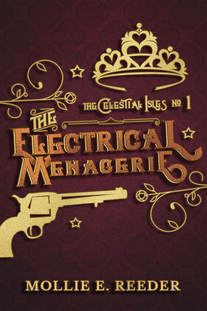 Book Review
Book Review
I was privileged to receive an advanced review copy of this amazing book, and here's my honest-to-goodness review!
The Electrical Menagerie
Mollie E. Reeder
My rating: ★★★★★
This book is absolutely magical in every way. This is the kind of book that swallows you up so thoroughly, you can’t stop thinking about it, even when you’re not reading. It’s heartfelt, imaginative, and filled with characters that I connected with from the very beginning. I knew after reading Arbrook Huxley and the Star-Crossed Lovers that I was in for a treat, but The Electrical Menagerie delivered—and then some.
Sylvester Carthage: This man is one of the most complex and well-developed characters I’ve seen in a while. There were a lot of times while reading his POV that I had to sit back and think, “Wow. That’s exactly what [that] feels like.” Even feelings I’d never consciously thought about. Reeder enabled me to connect with him from page one, and my sister will be the first to tell you that I got more than a little animated while telling her about him. He was strong in an extremely understated way—without even knowing it himself—and grew tremendously throughout the course of the book.
Arbrook Huxley: Huxley provided an effective foil for Carthage, who was a very morally upright character. Although he was a "good person" over all, Huxley was not averse to using underhand means to achieve desired ends from time to time. He’s also rather foulmouthed (in a made-up way), something that drives Carthage nuts—but over the course of the story, Huxley grew a lot, and learned to appreciate his quiet business partner. They both had something to teach the other, and I love that.
As for the world itself, I was constantly blown away by how well thought-out it was. I never had to scramble for a mental image, because Reeder always painted the picture in glowing colors. (And, unlike Tolkien, did not spend five pages lecturing on the state of the hills from all four points of the compass.) The murder-mystery side of the story had me constantly guessing, but there were enough personal battles to keep me engaged in that direction as well. I believed in Carthage and Huxley from the very beginning... even if they didn’t always believe in each other. Also, can I just say that Reeder got me attached to a robot? I mean really. The poor guy deserved better!
And now we come to the part of the review where I gripe at nitpicky things—except—I have nothing to gripe about. Maybe some of the tricks could have been explained a little better, and perhaps the first show in the book could have been elaborated on just a tad bit more, but other than that, I have nothing. All of the plot points were wrapped up in a neat little bow at the end, and nothing was left hanging. As for a content warning, there is quite a bit of drinking, and one character ends up rather drunk… but that only makes him incredibly sarcastic. Huxley’s habit of cursing doesn’t even count against the book, because every oath was made up!
In closing, I feel extremely privileged to have been able to enter the realm of The Electrical Menagerie. I am looking forward to seeing more of Carthage and Huxley in the future!
Published on June 09, 2018 00:00
June 1, 2018
May Book Reviews
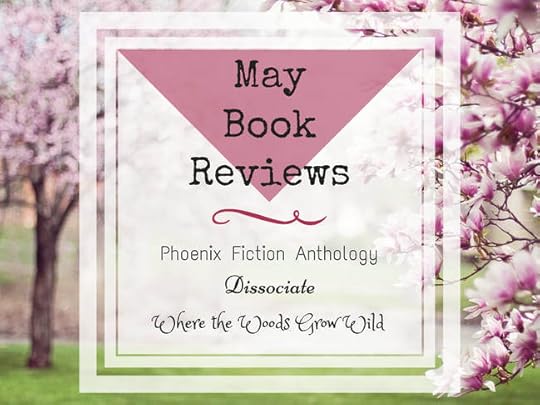 If April was an extremely productive reading month, May was average. I only finished three books, despite the fact that, (or maybe because of), I was also reading Little Dorrit by Charles Dickens the whole time. And so, I bring to you three reviews: one for the Phoenix Fiction Anthology (a collection of short stories by four awesome independent authors), one for Dissociate (the third book in a powerful ongoing series), and one for Where the Woods Grow Wild (Author Book Club's May read, and the first indie book I ever read, and re-read).
If April was an extremely productive reading month, May was average. I only finished three books, despite the fact that, (or maybe because of), I was also reading Little Dorrit by Charles Dickens the whole time. And so, I bring to you three reviews: one for the Phoenix Fiction Anthology (a collection of short stories by four awesome independent authors), one for Dissociate (the third book in a powerful ongoing series), and one for Where the Woods Grow Wild (Author Book Club's May read, and the first indie book I ever read, and re-read).The independent author community is strong with this post. If you're looking for recommendations towards that end, look no further.
Phoenix Fiction Anthology
Kyle Robert Shultz, J.E. Purrazzi, E.B. Dawson, Beth Wangler
My rating: ★★★★
Mythaken
Kyle Robert Shultz
First up in the Phoenix Fiction Anthology is a retelling of the minotaur-and-labyrinth myth from Greek mythology. It’s carried off with Shultz’s characteristic sense of humor and imagination, but some of the mythological elements came off a little too strong for me. For example the gods and goddesses were explained to be very much human (if immortal), but their behavior didn’t stray far from their original mythological counterparts. Still, it was a light-hearted beginning to the anthology, and I enjoyed getting inside the head of a minotaur for the first time in my life. xD
Stealing Life
J.E. Purrazzi
Our next stop is a wildly creative take on futuristic Japan. Stealing Life is probably the most intense one out of the four, but I enjoyed it. There’s just something about Purrazzi’s writing that’s like watching a movie in your head, and this short story is no exception. Personally, I found it a little creepy, but in a good way. It centers around people doing things with science that they never should have, and asks serious questions about life and death.
Government Man
E.B. Dawson
I’d been looking forward to reading this one for a while, and was not disappointed! It’s a dystopian adventure told through multiple POVs, following one man’s journey to the realization that he’s been fighting the wrong war all along. Each of the POV characters were unique, and I found myself chuckling more than once while reading the descriptions of Mr. and Mrs. Johnson. (After all, don’t we all know people like that?) And even though the story wrapped up nicely, I wouldn’t be opposed to seeing more of Caleb Weiss in the future. :P
The Lake of Living Water
Beth Wangler
Last up is an imaginative retelling of the Biblical account of the Fall, in a fictional universe. I loved the comfortable form of narration, as if the main character was telling you the story themselves. I think it takes real talent to make a perfect world interesting—and Wangler pulled it off. The synopsis says it’ll leave you feeling hopeful and refreshed, and it does. The Fall was not the end. One day Aia shall repair what was rent.
~~~~~~~~~~~~~~~~~~~~~~~~~~~~~~~~~ Dissociate
Sarah Addison-Fox
My rating: ★★★★
~ I received a free ARC in exchange for an honest review ~
Disowned was quiet and home-like, Dissemble was action-packed and intense, and Dissociate struck a nice balance between the two. It was less politically driven than Dissemble, (although the undercurrent of world happenings was still there), but I find myself favoring the “small stuff”—the things that mean a lot to the MCs but maybe have no far-reaching consequences—and there was plenty of that. It reminded me a lot more of Disowned, in fact, which I love.
One of my favorite things about the book was that the relationship we’ve been rooting for concerning certain characters was finally made official. Both of them stopped denying what the rest of the world could see already, and acknowledged their love for each other. (That’s not to say their relationship was not without bumps, however!) There were plenty of obstacles thrown into each character’s way, and there were several times I had to put my Kindle down and grin like a maniac, take a deep breath, or simply stare into space, because Sarah—how could you do such a thing??
As for characters, Mick is still the rather morally upright character I grew to know him as in the previous book, Celeste is learning that people really are capable of loving her, Torrance is on a difficult path to restoration as well, and Amaya grew leaps and bounds in my estimation with this book. Being pregnant suits her. xD Plus, I mean, you have to love a woman who will go full Enjolras and build a barricade while her husband is gone in order to protect orphans. I mean really.
The only thing craft-wise that I didn’t care for in Dissociate is that this is one of those books that just jumps in without any refresher at all, and while I admit that I probably have the worst memory of anyone of my age, I was a little confused sometimes. Also, Mick didn’t seem to know anything. xD I found myself thinking, several times during the first third of the book: “Wait… Mick doesn’t know that yet??” This probably wouldn’t bother me if I could remember what Mick did or didn’t know from the last book, so a quick sentence or two of explanation at critical moments would help tremendously. (But then again, none of this would be a problem for people that get to read all three right through, so this is mostly a personal gripe. *shrugs*)
Content comes in slightly increased swearing, drinking, getting very drunk, mentions of childhood abuse, an “off-screen” suicide, and quite a bit of sexual innuendo… although it was more of the kind concerned with staying pure before marriage and being faithful afterwards, so I personally found that less uncomfortable than the last book. There was also a whole lot of kissing (I lost count of instances early on, quite honestly), so if that bothers you, you’ve been warned.
Altogether, I enjoyed Dissociate a lot! The characters are all growing, and not staying stagnant. Mick, alone, is someone I’ve enjoyed watching mature throughout the series. There’s always a certain warmth to these books that I enjoy, and I think it comes from the family values portrayed within. The Haynes family has issues like any other, but they're courageous enough to love the ones that the world has rejected. And that’s something I think the real world needs a lot more of.
~~~~~~~~~~~~~~~~~~~~~~~~~~~~~~~~~
Where the Woods Grow Wild
Nate Philbrick
My rating: ★★★★
Where the Woods Grow Wild is a delightful read. It’s a clean, fast-paced fantasy adventure filled with likeable characters, vivid settings, and hilarious banter. As mentioned in my previous review, there’s a certain nostalgia that comes with this book, similar to stepping into Narnia for the first time, so when #AuthorBookClub decided to read this book for May, I was down for round two!
“And who are some of these likable characters?” you ask. Well, Martin is a lovable grump, Elodie is a beautifully level-headed and strong female character, Illo is another species of lovable grump, and Bramble is the kind of character that's hard not to love even when he creates big problems.
Something I noticed this time around that I don’t think I fully appreciated the first time was just how well thought-out and precise the plot was. It wasn’t overwhelmingly complicated, but it fit together perfectly at the end, and the foreshadowing was spot-on.
This was the first independent book I ever read, and it was a great introduction to a genre that I’ve since dived whole-heartedly into. As I mentioned in my previous review, some scenes were a little rushed, but the weight of the climax makes up for that. The romance is sweet, the forest setting is fully developed, and it’s a book that I would recommend to anyone looking for a wonderful read.
Published on June 01, 2018 00:00



